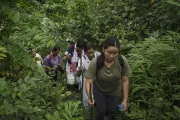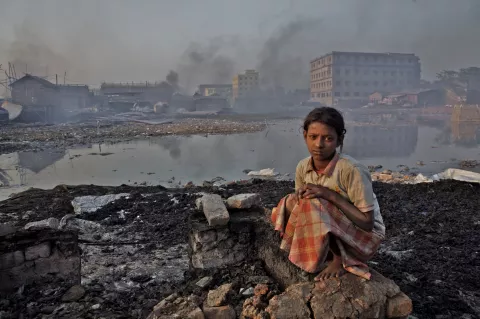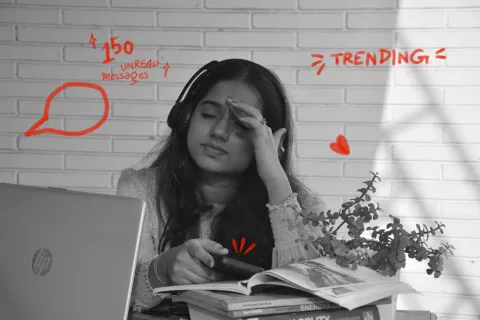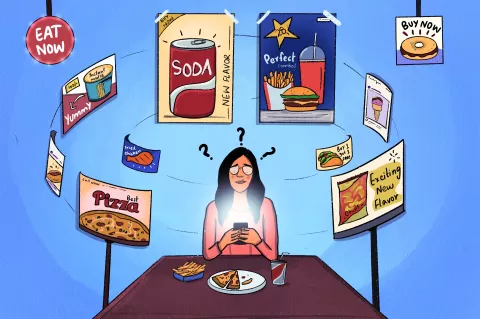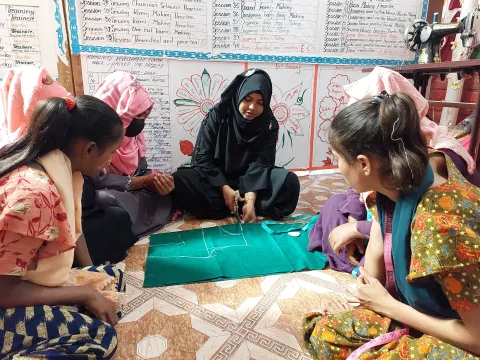His name was João. He was three years old. But small for his age. His skinny arm poked out the sleeve of his baggy, torn T-shirt.
As he turned his face to meet mine, completely white eyes stared back. He was blind.
The cause? Measles and a lack of Vitamin A.
That was 25 years ago. But it’s one of the images that haunts me to this day.
I was seeing what can happen when malnutrition, missed vaccinations and measles collide. Life-destroying — but preventable with vaccines and vitamins.
I was in Angola, on my first mission as a new doctor. The country was in the middle of a civil war.
Health services had been disrupted by the war, so João and many other children had missed their routine vaccines – and diseases were surging.
João had also become malnourished. This had left his body in need of vital nutrients to keep him strong, including vitamin A, which the cornea in the eye relies on to function.
Both factors meant that when João became infected with measles, his immune system was unable to fight it off.
As the measles infection progressed in João’s body, it depleted his already low levels of vitamin A. His cornea struggled to cope, becoming dry and then scarring over – causing his whole eye to turn milky white.
It would have happened frighteningly quickly. And once it had, there was nothing that could be done for him. He’d lost his eyes and would be blind for the rest of his life.
What broke my heart most was just how preventable it was. A simple measles vaccine and drops of vitamin A would have saved João’s eyes.
The experience fueled my desire to help people in desperate need of the very medical services that I’d been lucky enough to have in Belgium and taken for granted.
I spent the next 25 years supporting children, families and health workers across the world: from Kenya to The Democratic Republic of the Congo, to the Democratic People's Republic of Korea.
Over the years, I've fortunately seen far less children struck by preventable tragedy like the one faced by João.
Health services across the world have improved tremendously. We have more vaccines to combat more diseases and vaccination coverage has soared to new heights. Valiant efforts from health workers and governments to reach everyone mean more children can now get the vaccines they need to keep them safe. Measles has thankfully declined.
For the last three years I’ve been in South Asia, where the region has been fighting against COVID-19 and its knock-on impacts. There have been many impacts. Especially on vaccine preventable diseases. And I’ve never been so worried for the most vulnerable children.
Even though South Asia has done phenomenally well in responding to the COVID-19 pandemic, multiple crises are now colliding across the region and creating a perfect storm for children’s health.
Climate disasters, conflict and economic shocks have further displaced families, interrupted health services and made nutritious food less affordable and less accessible. More children have become malnourished and more have missed vaccines.
And, as always, the poorest children have been hit the hardest.
In 2021 alone, 3.8 million children in South Asia did not receive a single dose of life-saving vaccines.
These children are known as zero-dose children.
They come from the poorest families, in the most remote and inaccessible corners of the region. They’re also the most malnourished. Any disease is more dangerous when children are malnourished.
Frighteningly, measles cases have recently surged in South Asia, in the countries with the most zero-dose children. Cases have jumped in India. In Pakistan and Afghanistan, five times more children have had measles since 2020. Cases are still on the rise.
In the worst cases, measles can cause brain damage, deafness, blindness and death.
Unvaccinated, malnourished children are now especially vulnerable to measles.
And it’s not only measles. These children have been left with zero protection against diseases like diphtheria, pneumonia and meningitis too. Progress made in eliminating these diseases is now at risk, endangering children everywhere.
We cannot let this happen.
We must get all the life-saving services zero-dose children need to where they are, now.
This means starting with the communities where zero-dose children live. Isolated villages, tucked away in forests, impenetrable urban slums and areas facing conflict or climate disaster.
And supporting the community health workers — mainly female — who know these communities best and how to reach and track children who aren’t vaccinated.
When we reach zero-dose children to catch them up on vaccines, we must use the opportunity to get other life-saving services to them, at the same time.
The impact of integrating services like this cannot be overstated. The simple act of giving João vitamin A drops with a measles vaccination would have helped saved his sight.
‘One-stop-shops' for health and well-being are the most efficient and effective way to help zero-dose children with the multiple challenges they face. We must bring the services they need — essential healthcare, nutritious food, vitamins, water and sanitation and birth registration — to where they are.
It’s a big task. But it’s not impossible.
Over the last two years, vaccines have moved across South Asia like never before.
Through innovation, political will and health worker heroes, over 3 billion COVID-19 vaccines have been administered in the region.
Health systems have improved. Supply chains to deliver vaccines are stronger. And digital innovations for tracking COVID-19 vaccination, can now be used for childhood vaccinations.
South Asia’s achievements during COVID-19 show that rapid progress is possible. We can, and we must, keep the momentum going, to reach the most vulnerable children with the vaccination and health services they need.
By investing in health workers, innovation and integrated services, we can scale the last mile to reach these zero-dose children, prepare health systems to withstand future shocks and save lives.
What happened to João will never leave him. And the memory will never leave me.
But we can stop the same fate, or worse, from happening to more children.
To do that, we must act now.































